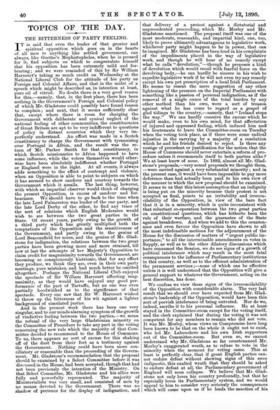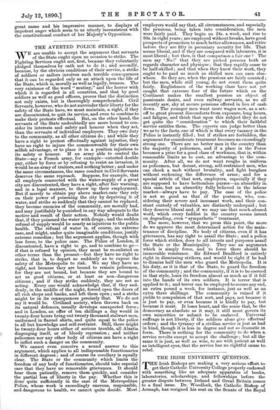TOPICS OF THE DAY.
THE BITTERNESS OF PARTY FEELING.
IT is said that even the leader of that greater and spiritual opposition which goes on in the hearts of all men to anything like settled government, can always, like Goethe's Mephistopheles, when he is pressed for it, find subjects on which to congratulate himself that his opposition has been extremely mild and for- bearing ; and we were reminded of this by Sir William Harcourt's taking so much credit on Wednesday at the National Liberal Club for the attitude of his party on Foreign and Colonial Affairs, and that in the midst of a speech which might be described as, in intention at least, pure oil of vitriol. No doubt there is a very good reason for this,—namely, that, in the first place, there has been nothing in the Government's Foreign and Colonial policy of which Mr. Gladstone could possibly have found reason to complain ; and. next, that it seems sufficiently clear that, except where there is room for charging the Government with deliberate and cynical neglect of the national feeling of other communities, the constituencies of Great Britain are apt to be very indifferent to questions of policy in distant countries which they very im- perfectly understand. An effort was made in a Scotch constituency to charge the Government with tyrannising over Portugal in Africa, and the result was the re- turn of Mr. Parker Smith for that constituency, in which Scotch missionaries to Africa happened to have some influence, while the voters themselves would other- wise have been absolutely indifferent whether Portugal or England were in the right. At all events, it always adds something to the effect of contempt and violence, when an Opposition is able to point to subjects on which it has seemed to show candour and courtesy towards the Government which it assails. The last thing, however, with which an impartial observer would think of charging the present Opposition, is excess of candour and for- bearance. We should have to go back to the time when the late Lord Palmerston was leader of the one party, and the late Lord Derby of the other, to find any trace of the sort of relations which English Moderates would -wish to see between the two great parties in the State. Of recent years, partly owing to the growth of a third party which has greatly multiplied both the temptations of the Opposition and the sensitiveness of the Government, and partly owing to the genius of Lord Beaconsfield for scorn, and the genius of Mr. Glad- stone for indignation, the relations between the two great parties have been growing more and more strained, till now at last the attempts of her Majesty's Opposition to claim credit for magnanimity towards the Government, are becoming so conspicuously histrionic, that for any effect they produce, we think they are, even in their own party meetings, pure mistakes, and had much better be omitted altogether. Perhaps the National Liberal Club enjoyed the spectacle of Sir William Harcourt affecting mag- nanimity, as they would have enjoyed any good per- formance of the part of Tartuffe, but no one was even partially hoodwinked as to the significance of that spectade. Every one saw that Sir W. Harcourt wished to throw up the bitterness of his wit against a lighter background of simulated justice. And in the present week there has been one very singular, and to our minds alarming symptom of the growth of vindictive feeling between the two parties,—we mean the refusal of the very large Gladstonian minority on the Committee of Procedure to take any part in the voting concerning the new rule which the majority of that Com- mittee decided to recommend to the House of Commons. To us, there appears no sort of excuse for this shaking off of the dust from their feet as a testimony against the Government. Nothing could have been more con- ciliatory or reasonable than the proceeding of the Govern- ment. Mr. Gladstone's recommendation that the proposal should be examined by a Select Committee before it was discussed in the House, had been accepted, though that had not been previously the intention of the Ministry. On that Select Committee, Mr. Gladstone and his allies were fully and powerfully represented. The majority of Ministerialists was very small, and consisted of men by no means devoted to the Government. There was no shadow of pretence for the display of indignation, and that delivery of a protest against a dictatorial and unprecedented proceeding, which Mr. Morley and Mr. Gladstone sanctioned. The proposal itself was one of ths most moderate, reasonable, and impartial kind, one, too, likely to prove ultimately advantageous to legislative work, whichever party might happen to be in power, that can be imagined. Mr. Gladstone has been loud in his complaints of the impediments placed in the way of legislative work, and though he will hear of no remedy except what he calls "devolution,"—though he proposes a kind of devolution which would recoil with fearful force on the devolving body,—he can hardly be sincere in his wish to expedite legislative work if he will not even try any remedy except his own pet prescription of a local Irish Parliament. He seems to resent the mere suggestion of any other lightening of the pressure on the Imperial Parliament with something like a passion of personal indignation, as if the removal of a single ounce of the total burden by any other method than his own, were a sort of treason against what he has come to regard as a gospel of glad tidings to the country,—namely, that "Ireland stops the way." We can hardly conceive the excuse which he- would make, even to his own mind, for that affectation of injured and oppressed feeling, which induced him and his lieutenants to leave the Committee-room on Tuesday when the voting took place, as if there were some radical injustice in the carrying by a majority of a resolution which he and his friends desired to reject. Is there any vestige of precedent or justification for the notion that the House of Commons should never entertain a reform of pro- cedure unless it recommends itself to both parties alike ? We at least know of none. In 1882, almost all Mr. Glad- stone's proposals,—very sound proposals we thought them, —were carried against a very substantial minority; and in the present case, it would have been impossible to pay more deference than had actually been paid to his own view of the manner in which the new proposal should be examined. It seems to us that this latest assumption that an indignity is being put on the minority because their protest is not accepted as final, points to an irritability and irrecon- cilability of the Opposition, in view of the bare fact that it is in a minority, which is quite inconsistent with that reluctant co-operation between the two great parties on constitutional questions, which has hitherto been the rule of their warfare, and the guarantee of the State against breakdown. And when we add to this the counten- ance and even favour the Opposition have shown to all the most indefensible motions for the adjournment of the House for the discussion of matters of "urgent public im- portance," to all the interminable amendments on votes in Supply, as well as to the other dilatory discussions which have consumed the Session, we do see signs of a growth of political intolerance which may result in the most fatal consequences to the influence of Parliamentary institutions in this country, as well as to the efficient administration of the permanent services ;—none of which can be effective unless it is well understood that the Opposition will give a general support to whatever the Government, acting on its best discretion, has done.
We confess we view these signs of the irreconcilability of the Opposition with considerable alarm. The very last result that we should ever have expected from Mr. Glad- stone's leadership of the Opposition, would have been this sort of peevish intolerance of being outvoted. Nor do we, indeed, ascribe it to his personal influence. He at least stayed in the Committee-room except for the voting itself, and the clerk explained that during the voting it was not competent for any members to remain who did not vote. It was Mr. Morley, whose views on Compromise have long been known to be that on the whole it ought not to exist, who led Mr. Labouchere and his own Irish supporters out of the Committee-room. But even so, we cannot understand why Mr. Gladstone so far countenanced Mr. Morley's exaggerated wrath, as to refuse to vote in the minority when the moment for voting came. This at least is perfectly clear, that if great English parties can- not endure defeat without showing signs of this neva inclignatio, this exalted wrath that they should be asked to endure defeat at all, the Parliamentary government of England will soon collapse. We believe that Mr. Glad- stone not only loves his country profoundly, but that he especially loves its Parliamentary. system, and we would appeal to him to consider very seriously the consequences which will come upon us if he lends the sanction of his great name and. his impressive manner, to displays of impotent anger which seem to us utterly inconsistent with the constitutional conduct of her Majesty's Opposition.



































 Previous page
Previous page